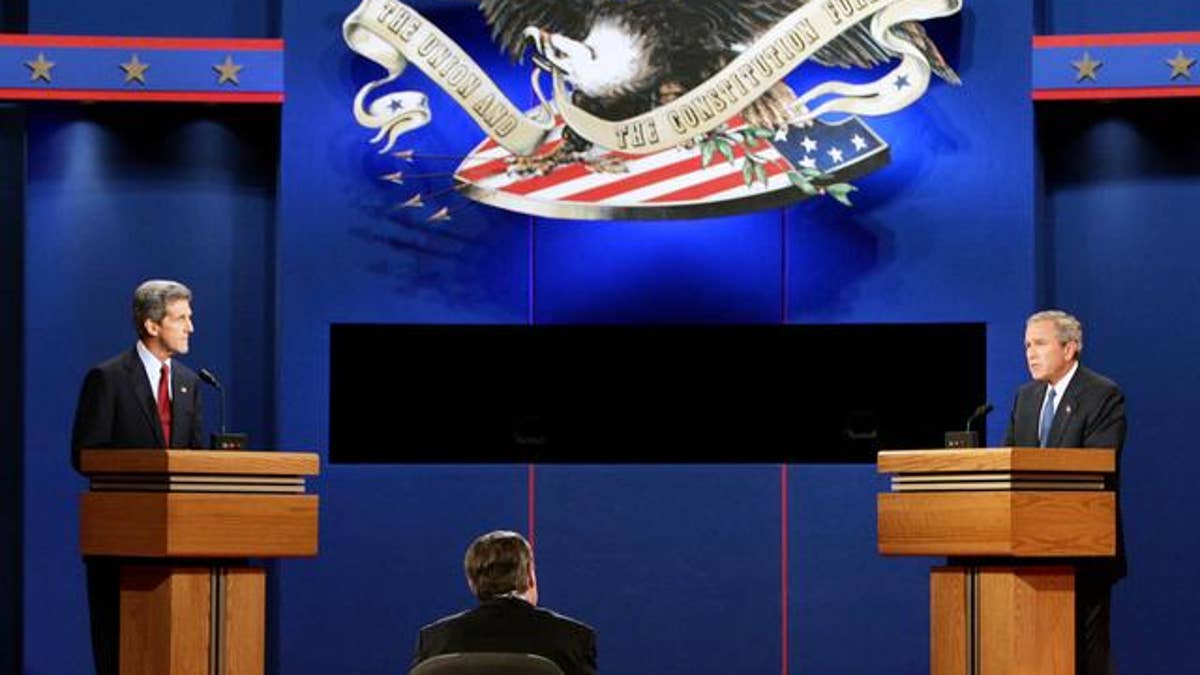
Democratic presidential candidate John Kerry, left, listens to President Bush during the presidential debate in Coral Gables, Fla., Thursday, Sept. 30 2004. Debate moderator Jim Lehrer is at center. (AP Photo/Ron Edmonds)
Minutes after the Commission on Presidential Debates, or CPD, announced that CNN’s Candy Crowley would be the first woman in 20 years to moderate one of the 2012 debates, the Twitterverse started burning up with the question: Why wasn’t a Latino chosen to chair this staple of the election season, culminating in a letter from Univision to the CPD demanding one for Hispanic audiences.
The media juggernaut didn’t get its debate but has arranged with both the Obama and Romney campaigns to broadcast individual “candidates” forums.
The CPD’s decision reflects how it views and defines “diversity”: if the norm is a white male journalist, then “difference” is a white woman (ABC’s Martha Raddatz is moderating the lone vice-presidential debate). It appears this organization isn’t aware of the 2010 Census results which confirm the game-changing Hispanic population’s growth.
While I support a candidates forum because of its public service value, I am against a “Latino” debate for four reasons.
Firstly, the demographic boom is led by U.S. born and English dominant Hispanics.
With different degrees of fluency, they speak Spanish in the home, if at all, sometimes watch a telenovela with their abuela, and listen to international rock star Juanes.
But they are as likely to be hooked on American Idol, singing along to “Call me Maybe,” and tweeting in a version of Spanglish.
These young Latinos are not just our future, they’re here “in” the American space which is as much theirs as anyone else’s.
An Hispanic debate in Spanish doesn’t speak to this growing segment of our population and electorate which is American, although heavily drawing upon the language and culture of their parents.
Secondly, that issues particular to this community such as immigration can only be addressed in a Spanish-language format perpetuates the flawed logic that Latino voters are a political “one trick pony.”
Most polls, including a Gallup and Pew Hispanic Center survey, show immigration didn’t make the “top five” issues, ranking in importance for Hispanics behind jobs, education, and health care.
To put a premium on immigration misses this voting bloc’s complexity for whom this hot-button issue matters deeply but that has felt the Great Recession in terms of decimated household wealth more acutely than African-Americans and whites.
My third point is that Hispanic “issues” are thoroughly American ones, not just because this group is also deeply worried about the “bread and butter” topics of the economy, jobs, and education.
The growth and the limitations of this segment of the population affects us all--the alarming rate of Latino high school drop outs today translates into workers of the future losing out to better prepared Chinese and Indian counterparts, seriously impeding American competitiveness.
Continuing erosion in Hispanic household wealth means our communities suffer and potential is stunted--businesses not opened and homes not bought or, worse, foreclosed upon. A “Latino” debate separates Hispanics and Americans from the most important issues that unite us.
Which leads to my fourth point.
Journalists of Hispanic descent can compete with the best of them.
Univision’s Jorge Ramos and María Elena Salinas (who preceded Diane Sawyer and Katie Couric in the national evening news anchor chair) are veteran journalists who combined, have interviewed every U.S. president since George H.W. Bush, countless world leaders, and popes.
Columnist Ruben Navarrette is an equal opportunity instigator, getting under the skin of Republicans, Democrats, Latinos, and Whites for more than fifteen years with his biting commentary in print and on TV. Their questions would at once address American issues, relate to Hispanics, and send a powerful visual that the mainstream media respects the importance of Hispanic viewers.
This is the long-term view that if implemented consistently and integrated fully into an organization’s culture will lead TV networks to hit a $1 trillion dollar Latino media market home run.
The most important task for the moderators is in the questions they ask and follow up with.
Will they probe President Obama and Gov. Romney on the country’s unemployment rate and cite that among Hispanics, it’s more stubborn, constantly trending two points above the national average?
This line of questioning is not just inclusive of a large portion of the population but also sheds light on the intersections between class, ethnicity, and race.
A Latino moderator would have hit at least a double (and a “triple” if María Elena Salinas had been chosen since at once she “speaks” to the mainstream, Latinos, and women) because she not only observes the demographic, economic, political, and social changes, but makes the connections between our communities that together form the bedrock of our country.
Viviana Hurtado is the founder and blogger-in-chief at The Wise Latina Club and the host of Hispanic Business Today: American Success Stories, nationally syndicated on NBC.
She is a regular columnist for Fox News Latino. You can follow her on twitter at: @vivianahurtado
Follow us on twitter.com/foxnewslatino
Like us at facebook.com/foxnewslatino




